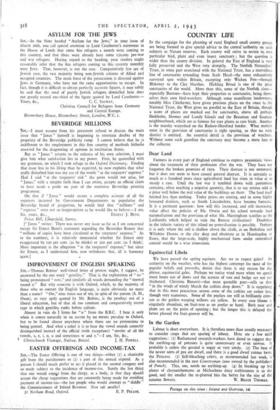IMPROVEMENT OF ENGLISH SPEAKING
Sta,—Thomas Robins' well-timed letter of protest might, I suggest, be answered by the one word " gentility." That is the explanation of " no " being pronounced " now," and similarly all words demanding the " normal round o." But why associate it with Oxford, which, to the majority of those who so contort the English language, is quite obviously no more than a name? " Ow," nine times out of ten, in spite of the parson (A. M., Oxon), so very aptly quoted by Mr. Robins, is the product not of a liberal education, but of that all too common and comparatively recent type in which gentility ranks before culture.
Almost in vain do I listen for " o " from the B.B.C. I hear it only when it comes naturally in an accent by no means peculiar to Oxford, but to be found almost anywhere where there are no pretensions to being genteeL And what a relief it is to hear the vowel sounds correctly distinguished instead of the official (with exceptions) " omelet of all the vowels, a, e, i, o, u and sometimes w and y."—I am, Sir, &c., e Christchurch Vicarage, Nausea, Bristol. J. H. Powsu..


























 Previous page
Previous page